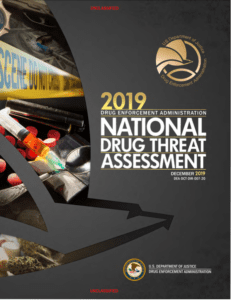DEA Warns that Counterfeit Pills and Fentanyl Continue to Threaten Americans
The U.S. Drug Enforcement Administration (DEA) has released its 2019 National Drug Threat Assessment, which is an annual report that synthesizes information from law enforcement agencies across the country to inform policies, establish priorities, and allocate resources. With agents scattered across the nation and in nearly 70 other countries, the DEA has a comprehensive understanding of the threats posed to the U.S. by domestic and international drug trafficking and the abuse of licit and illicit drugs.
 Fentanyl and other synthetic opioids were the first substances to be discussed in this report. Ninety-two percent of DEA field division offices (FDO) saw an increase in the availability of fentanyl in their area during 2018.
Fentanyl and other synthetic opioids were the first substances to be discussed in this report. Ninety-two percent of DEA field division offices (FDO) saw an increase in the availability of fentanyl in their area during 2018.
 While the DEA reports that fentanyl is still coming to the U.S. from China and Mexico, India began to emerge in late 2018 as a source country for fentanyl and its precursor ingredients. As reported by U.S. News and World Report, China scheduled all fentanyl-related drugs as controlled substances in 2019, closing a loophole used by chemists to stay ahead of the law by creating new analogues that have not yet been banned.
While the DEA reports that fentanyl is still coming to the U.S. from China and Mexico, India began to emerge in late 2018 as a source country for fentanyl and its precursor ingredients. As reported by U.S. News and World Report, China scheduled all fentanyl-related drugs as controlled substances in 2019, closing a loophole used by chemists to stay ahead of the law by creating new analogues that have not yet been banned.
 Counterfeit fentanyl pills remain a concern for the DEA. Testing of this type of counterfeit pill found individual pills contained fentanyl ranging from 0.02 to 4.84 milligrams per pill. 13% of the pills DEA tested contained more than 2.0 milligrams of fentanyl, which is considered a fatal dose. The DEA sees counterfeit pills containing fentanyl to be one of the contributing factors to the record number of overdose deaths seen across the U.S. in 2017.
Counterfeit fentanyl pills remain a concern for the DEA. Testing of this type of counterfeit pill found individual pills contained fentanyl ranging from 0.02 to 4.84 milligrams per pill. 13% of the pills DEA tested contained more than 2.0 milligrams of fentanyl, which is considered a fatal dose. The DEA sees counterfeit pills containing fentanyl to be one of the contributing factors to the record number of overdose deaths seen across the U.S. in 2017.
 The types of counterfeit pills and substances contained within them has increased. The report noted fake pills containing dipyrone, a painkiller banned in the U.S. because it can cause a serious and sometimes fatal blood condition. Counterfeit Adderall pills made with methamphetamine are a growing problem, with cases in Michigan and Florida cited in the report. Fake pills made with cocaine showed up in Massachusetts and New Jersey. In 2018, law enforcement seized fake Xanax pills that contained a fentanyl analogue, methamphetamine, and a synthetic cannabinoid.
The types of counterfeit pills and substances contained within them has increased. The report noted fake pills containing dipyrone, a painkiller banned in the U.S. because it can cause a serious and sometimes fatal blood condition. Counterfeit Adderall pills made with methamphetamine are a growing problem, with cases in Michigan and Florida cited in the report. Fake pills made with cocaine showed up in Massachusetts and New Jersey. In 2018, law enforcement seized fake Xanax pills that contained a fentanyl analogue, methamphetamine, and a synthetic cannabinoid.
 While large-scale drug trafficking organizations may be flooding American cities with the largest volume number of counterfeit pills, the DEA found that small-scale drug organizations are purchasing fentanyl on the Internet, turning it into counterfeit pills, and selling those online. The DEA stated in their report that as long as there is a population in the country who are abusing prescription pills, drug trafficking organizations of all sizes will continue to make and sell these fake, sometimes deadly, pills across the country.
While large-scale drug trafficking organizations may be flooding American cities with the largest volume number of counterfeit pills, the DEA found that small-scale drug organizations are purchasing fentanyl on the Internet, turning it into counterfeit pills, and selling those online. The DEA stated in their report that as long as there is a population in the country who are abusing prescription pills, drug trafficking organizations of all sizes will continue to make and sell these fake, sometimes deadly, pills across the country.
To learn more about the danger that pill presses pose to Americans, please read the NADDI-NABP-PSM report: Illegal Pill Presses: an Overlooked Threat to American Patients.
